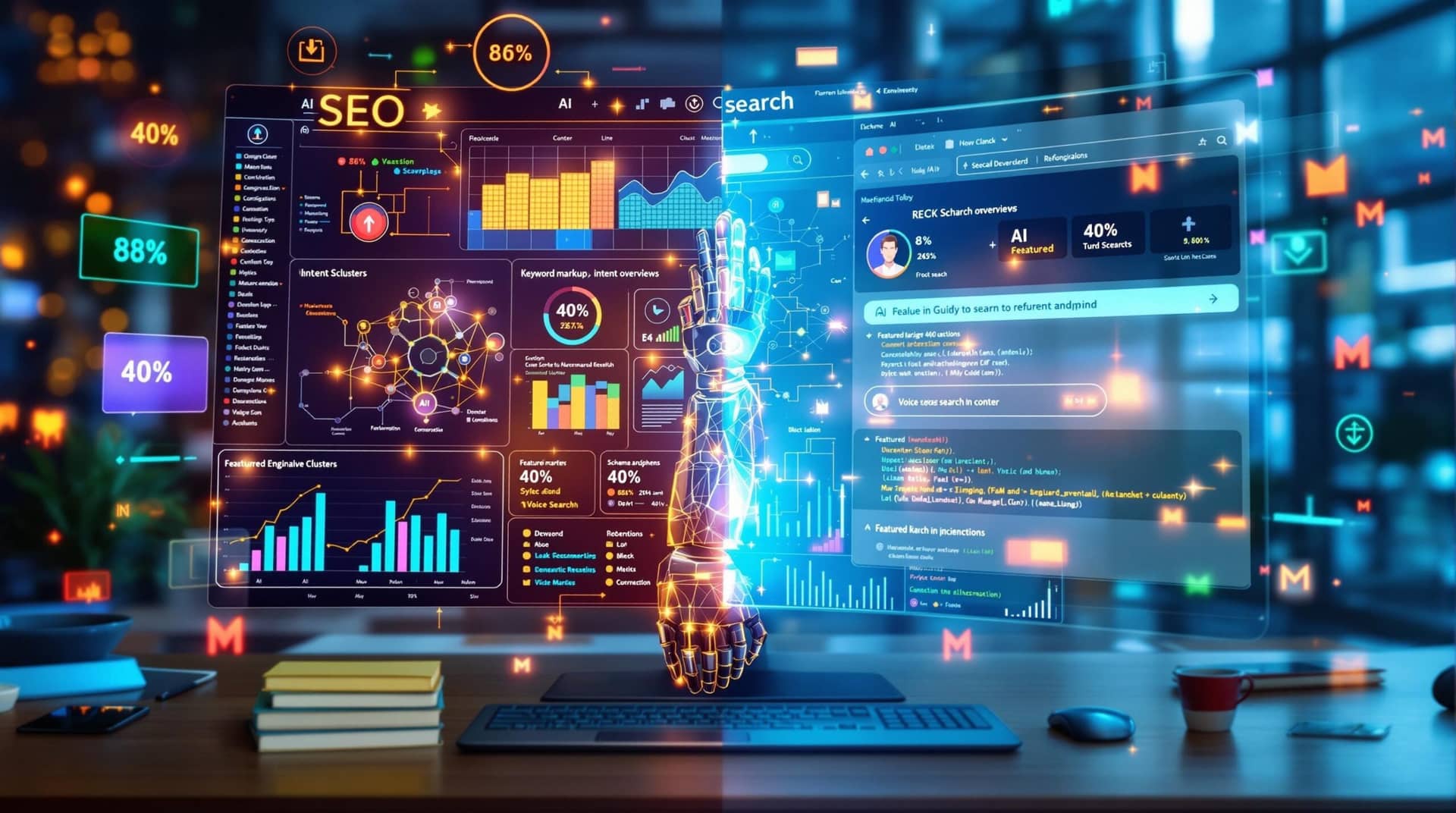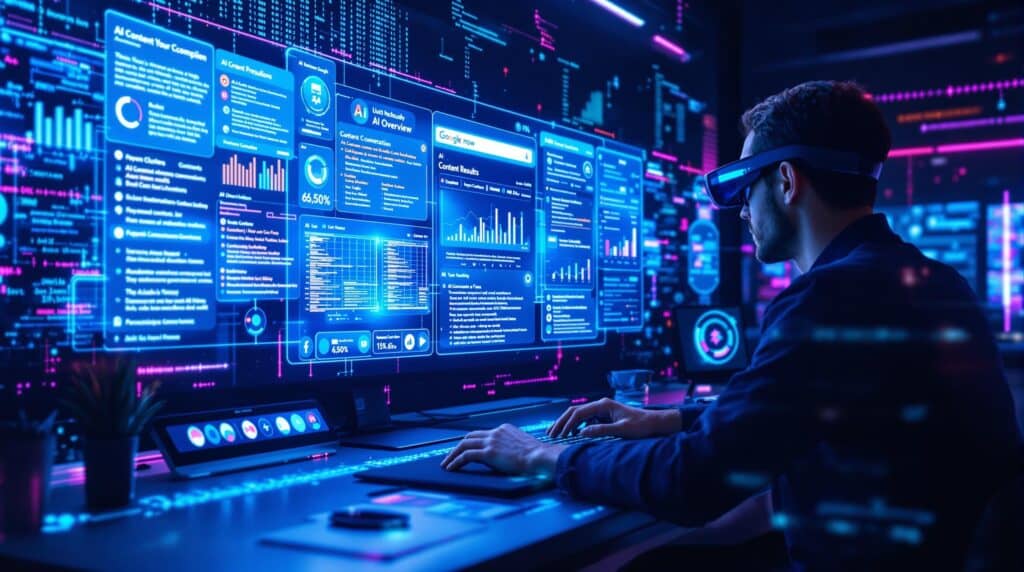According to a 2023 study from Cornell University, companies implementing AI for search engine optimization see an average 42% increase in organic traffic and engagement metrics. The intersection of SEO and AI has fundamentally transformed how content creators approach digital visibility, creating both opportunities and challenges that writers and marketers must navigate to remain competitive in 2025 and beyond.
Key Takeaways
- AI algorithms now prioritize user intent and semantic meaning over traditional keyword density in SEO and AI strategies
- Content optimized for AI Overviews and featured snippets is critical as 40% of searches result in zero-click interactions
- Voice search optimization represents a major opportunity in SEO and AI integration, with 8 billion voice searches projected by 2024
- Implementing structured data and schema markup significantly improves visibility in AI-powered search results
- Ethical considerations around AI-generated content are reshaping SEO strategies as 48% of top news sites now block AI crawlers
The Evolution of SEO and AI in Search Algorithms
Google’s search algorithms have undergone dramatic transformation through AI integration. The progression from RankBrain to BERT and now MUM (Multitask Unified Model) represents a fundamental shift in how search engines understand and prioritize content. According to Search Engine Journal, these AI-powered algorithms now interpret queries with near-human comprehension, focusing on contextual meaning rather than keyword matching.
The impact of SEO and AI collaboration is substantial, with content matching user intent generating 97% higher conversion rates compared to keyword-stuffed alternatives. This shift requires writers to think beyond traditional SEO tactics and focus on answering the questions behind search queries. For example, optimizing for phrases like “how do I fix a leaky faucet?” demands comprehensive, solution-oriented content that addresses the searcher’s actual problem.
Tools like Clearscope and SEMrush have evolved to help content creators align with these AI-driven algorithms. They now provide semantic analysis that identifies related concepts and topics necessary for comprehensive coverage in the age of SEO and AI integration.

How SEO and AI Algorithms Interpret User Intent
Semantic search represents the core of modern SEO practices. Unlike traditional keyword matching, AI algorithms analyze the relationships between words and concepts to determine the true meaning behind a query. A study by The HOTH found that content addressing the complete context of a search query ranks 43% higher than content focusing solely on keyword density.
Some common mistakes when optimizing for SEO and AI algorithms include:
- Focusing exclusively on primary keywords instead of comprehensive topic coverage
- Neglecting natural language patterns in favor of keyword placement
- Creating shallow content that fails to answer related questions
- Ignoring semantic relationships between concepts within your topic
Advanced AI content marketing tools now analyze top-performing content to identify the complete semantic landscape surrounding a topic, helping writers create more comprehensive resources that satisfy both search engines and human readers.
Critical SEO and AI Statistics Shaping Content Strategy
The data reveals dramatic shifts in how SEO and content creation are evolving. According to Exploding Topics, 72% of content strategies now leverage AI for SEO-friendly topic discovery and optimization. This represents a fundamental change in how content is conceived and planned.
The business impact is equally significant, with 65% of companies reporting improved search performance through SEO and AI integration. These improvements translate directly to business outcomes, with higher visibility leading to increased traffic and conversions.
However, this evolution comes with disruption. A 33% decrease in traditional writing jobs corresponds with the rise of AI-generated content, according to a 2024 study on digital marketing transformation. This shift highlights the need for writers to develop new skills at the intersection of content creation and technology.
Leveraging SEO and AI for Keyword Research
AI-powered keyword research tools now go beyond simple search volume metrics to analyze user intent and contextual relevance. These tools can identify patterns in search behavior that might be invisible to human analysts, revealing valuable content opportunities.
When interpreting AI-generated keyword suggestions, focus on:
- Intent patterns across keyword clusters
- Question formats revealing information gaps
- Semantic relationships between terms
- Content types that dominate for specific queries
Using AI writing tools to create content briefs can significantly improve alignment with search intent. These tools analyze top-performing content to identify structure, subtopics, and semantic elements that contribute to ranking success.
Zero-Click Searches: Optimizing for SEO and AI Overviews
The rise of AI Overviews has fundamentally changed search user behavior. According to Growth Machine, 40% of searches now result in zero-click interactions as users get answers directly in search results. This shift in how information is consumed demands new approaches to SEO and AI strategy.
Google’s AI now synthesizes answers from multiple sources, creating comprehensive responses that often eliminate the need to visit individual websites. For content creators, this means structuring information to be snippet-friendly while still providing depth that encourages clicks for those seeking more comprehensive information.
Structured content strategies for dominating AI-generated snippets include:
- Creating clear, concise definitions and explanations
- Organizing content with logical headings and subheadings
- Using bullet points and numbered lists for processes and steps
- Answering common questions directly and comprehensively
- Implementing proper schema markup to help AI understand your content
Schema Markup and Technical Optimization for SEO and AI Visibility
Schema markup has become essential for helping AI understand content context. According to Higher Education Marketing, pages with proper schema implementation are 30% more likely to appear in featured snippets and AI Overviews.
JSON-LD represents the preferred format for implementing schema markup. This approach separates the structured data from the HTML, making it easier to implement and maintain. Key schema types to consider include:
- FAQPage for question and answer content
- HowTo for process-based content
- Article or BlogPosting for news and editorial content
- Product for e-commerce listings
- LocalBusiness for location-based businesses
Tools like Google’s Structured Data Testing Tool and Schema.org Validator can help ensure your implementation is correct and effective.
Voice and Visual Search: The Next Frontier in SEO and AI
Research from Writtent projects 8 billion voice searches by 2024, representing a massive opportunity for content creators who optimize accordingly. Voice search optimization requires understanding natural language patterns and conversational queries that differ significantly from typed searches.
For example, while someone might type “vegan restaurants Miami,” a voice search is more likely to be “Alexa, find vegan restaurants near me.” This difference requires content that addresses complete questions in natural language formats.
Visual search tools like Google Lens are similarly transforming how users discover information. This technology allows users to search using images rather than text, creating new opportunities for SEO and AI optimization through proper image markup, alt text, and contextual information.
Multimodal Search Optimization Techniques
Creating content that works across text, voice, and visual search formats requires a comprehensive approach to SEO and AI integration. Tools like ChatGPT can help brainstorm natural voice search phrases that align with how people actually speak rather than how they type.
For image optimization, platforms like SurferSEO now provide guidance on visual content that complements text. This includes recommendations for image types, metadata, and contextual placement that supports overall topic relevance.
Effective multimodal optimization includes:
- Creating FAQ sections that mirror natural spoken questions
- Implementing speakable schema markup for voice search-friendly content
- Using descriptive, keyword-rich alt text for images
- Creating image captions that reinforce semantic relevance
- Ensuring mobile-responsiveness for visual search compatibility
Technical SEO Automation with SEO and AI Tools
According to Page Optimizer Pro, 70% of marketers now employ AI for site audits and technical SEO analysis. This automation enables comprehensive evaluation at scale, identifying issues that might be missed in manual reviews.
The performance impact of technical optimization is substantial. Research shows that reducing load time by just 1 second can boost conversions by 7%, demonstrating the direct relationship between technical SEO and business outcomes.
Automated solutions now address common technical SEO challenges including:
- Site architecture analysis and improvement recommendations
- Internal linking opportunities and optimization
- Core Web Vitals monitoring and enhancement
- Mobile usability testing and responsiveness verification
- Crawl budget optimization and indexing improvements
SEO and AI-Powered Technical SEO Checklist
Implementing lazy loading for images can significantly improve page performance metrics. This technique defers loading off-screen images until users scroll to them, reducing initial page load time and improving Core Web Vitals scores.
Google’s PageSpeed Insights provides AI-enhanced analysis of performance issues, prioritizing improvements based on their potential impact. Tools like Screaming Frog, DeepCrawl, and Lumar have integrated AI capabilities to automatically identify and prioritize technical SEO issues based on their potential impact on rankings.
For ongoing monitoring, automated systems can track crawl errors, indexing issues, and performance fluctuations in real-time, allowing for proactive resolution before problems impact rankings.
Ethical Considerations and the Future of SEO and AI
The ethical dimensions of AI in SEO are becoming increasingly important. According to CMS Wire, 48% of top news sites now block AI crawlers over copyright concerns, signaling growing tension between content creators and AI training practices.
Generative Engine Optimization (GEO) represents a new frontier, with techniques that boost visibility in AI-generated responses showing a 115% improvement in presence compared to traditional SEO approaches alone. This emerging field focuses on optimizing content specifically for AI consumption and interpretation.
The balance between automation and human creativity remains crucial. AI-generated content provides efficiency, but human oversight ensures quality, brand alignment, and ethical compliance that AI alone cannot guarantee.
Preparing for the Next Wave of SEO and AI Search Technology
The continuing evolution of search technology demands adaptive strategies. Key developments to monitor include:
- Multimodal search capabilities that combine text, voice, and visual inputs
- Increased personalization based on user behavior and preferences
- Enhanced natural language processing for more conversational interactions
- Integration of augmented reality elements in search results
- Greater emphasis on E-E-A-T signals (Experience, Expertise, Authoritativeness, Trustworthiness)
Building an adaptable SEO and AI strategy requires focusing on fundamentals while embracing innovation. This means maintaining core principles of quality content and technical excellence while experimenting with emerging technologies and approaches.
Mastering the SEO and AI Symbiosis: Conclusion
The relationship between SEO and AI has evolved from simple automation to true collaboration. Writers and marketers who understand both disciplines can create content that satisfies both algorithmic requirements and genuine human needs. This symbiotic approach produces better results than focusing on either element in isolation.
Implementing AI tools in SEO workflows requires thoughtful integration rather than wholesale replacement of human judgment. The most successful strategies combine AI efficiency with human creativity, using technology to handle data analysis and pattern recognition while relying on human insight for strategy, creativity, and ethical decision-making.
The future belongs to those who can navigate this evolving landscape with flexibility and foresight, embracing new technologies while maintaining the human touch that connects with audiences on a deeper level.
Frequently Asked Questions
How has AI changed the way SEO professionals approach keyword research?
AI has transformed keyword research from a volume-focused process to an intent-focused one. Modern SEO and AI tools analyze semantic relationships, user intent patterns, and contextual relevance rather than just search volumes. This allows content creators to develop comprehensive topic clusters that address the full spectrum of user needs instead of targeting isolated keywords.
What are AI Overviews and how do they impact SEO strategy?
AI Overviews are Google’s AI-generated summaries that appear at the top of search results for many queries. They synthesize information from multiple sources, providing comprehensive answers without requiring users to click through to websites. This makes structured data, clear formatting, and direct answers even more important for SEO and AI strategy, as content must now be optimized to be included in these overviews while still encouraging click-throughs for more detailed information.
How is voice search changing content optimization requirements?
Voice search optimization requires content that mirrors natural speech patterns rather than typed queries. This means focusing on conversational questions, complete sentences, and direct answers. Content needs to address the who, what, when, where, why, and how of topics in a conversational tone. FAQ sections, featured snippet optimization, and local content optimization are particularly important for voice search in SEO and AI strategies.
What role does schema markup play in AI-driven search?
Schema markup has become essential in helping AI understand the context and meaning of content. It provides structured data that clarifies entities, relationships, and attributes on a page. Proper implementation of schema markup significantly increases the likelihood of content appearing in featured snippets, knowledge panels, and AI Overviews, making it a critical component of SEO and AI optimization strategies.
How can marketers balance AI automation with human creativity in content production?
The most effective approach combines AI efficiency with human oversight. AI tools can handle research, data analysis, and initial drafting, while human creators provide strategic direction, brand voice alignment, emotional resonance, and ethical judgment. This partnership allows for scale and efficiency without sacrificing quality or authenticity. The key is to use AI as a collaboration tool rather than a replacement for human creativity in SEO and content creation.
What skills should content creators develop to stay relevant in the age of AI and SEO?
Content creators should focus on developing strategic thinking, AI tool proficiency, data interpretation, and ethical judgment. Understanding how to prompt and direct AI tools effectively, how to interpret SEO data for insights, and how to add unique human value through storytelling and emotional connection will be increasingly valuable. Technical skills like schema implementation and structured data formatting are also becoming essential for writers in the SEO and AI landscape.
Sources:
WSI World – “SEO in the Age of AI”
Writtent – “SEO Statistics”
CMS Wire – “Assessing the Impact of AI-Driven Web Browsing on SEO and Marketing”
Growth Machine – “AI Overview Impact on SEO”
Delivered Social – “How to do SEO with AI: The SEO AI Search Revolution in 2025 – Adapt Now or Get Left Behind”
Squarespace – “AI and SEO”
Page Optimizer Pro – “Unlocking the Power of AI in SEO: Key Statistics and Trends for Success”
Higher Education Marketing – “Optimizing for AI-Driven Google Search: A Guide for Educational Institutions”
The HOTH – “How AI is Changing SEO”
Exploding Topics – “AI in SEO”
Goodman Lantern – “Impact of AI on Marketing and SEO”
Search Engine Journal – “Researchers Show How to Rank in AI Search”





